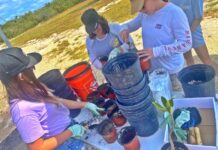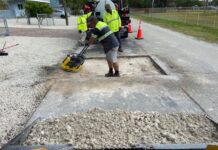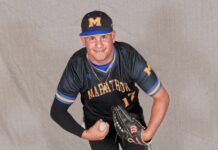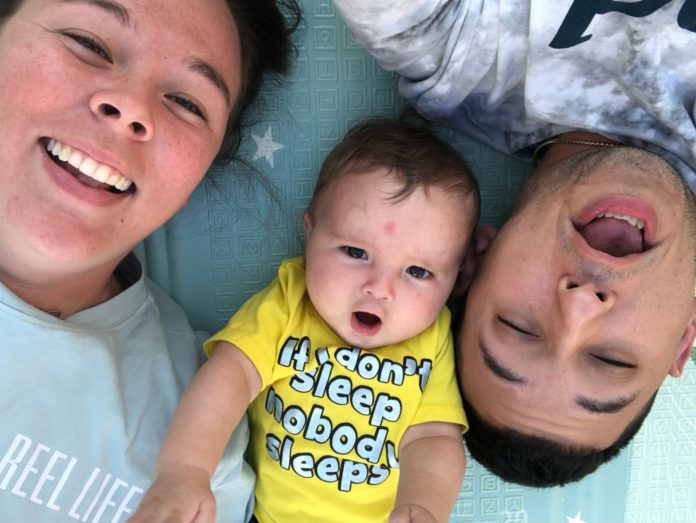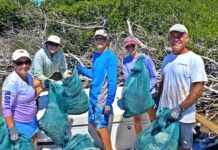Meet Carter Reyes. He’s nine months old, completely adorable, and depending on whom you ask, looks just like the Gerber baby.
For the first few months, Carter’s life with his mom Kaitlin, a medical assistant at Dolphin Research Center, and dad Zodiac, a sales manager for Florida Keys Jewelry in Key Largo, was completely normal. That all changed at his two-month checkup.
“(Our doctor) could tell that his lips were pale, so he ran a blood test right there,” Kaitlin told the Weekly. “He came back in the room and was like, ‘You need to go to the emergency room, right now.’”
In the seven months since, Nicklaus Children’s Hospital has been a second home for Carter and his family as they traveled back and forth from their Key Largo home to Miami for a litany of tests, trying to nail down the root cause behind the low hemoglobin levels in his blood.
Even after an initial blood transfusion appeared to help, subsequent visits revealed a “downward trend” in Carter’s hemoglobin, platelets and white blood cell counts. By four months old, he was already undergoing the first of several bone marrow aspirations. When repeated needle sticks for IV lines proved more and more difficult as his little veins built up scar tissue, he eventually had surgery to place a port in his chest for future transfusions.
Genetic testing eventually revealed the answer in early January, as Carter was diagnosed with Pearson syndrome, an exceedingly rare disorder characterized by deletions of nucleotides in his cells’ mitochondrial DNA. Those who had the phrase “the mitochondria is the powerhouse of the cell” drilled into their brains in high school may realize the logical effect: the deletions mean that cells lack critical proteins needed to convert energy from food into usable forms.
“They ran his mitochondrial genome against another normal genome. They found that 4,500 genes in his mitochondrial DNA are just gone,” Kaitlin said.
And when we say the diagnosis is rare, we mean it – since the syndrome’s discovery in 1979 by Howard Pearson, there have been fewer than 100 cases documented in literature worldwide.
Pearson syndrome is a severe progressive condition, proving fatal for about half of the children with the disorder in infancy or early childhood. Its progression is unique in each case, making it difficult to tell at what point it will affect other body systems.
Older surviving patients frequently suffer from Kearns-Sayre syndrome, a related neuromuscular condition with wide-ranging effects on the eyes, ears, kidneys, heart, brain and more. As of now, there is no cure or known treatment for Pearson syndrome, aside from managing individual symptoms in different systems as they manifest.






Armed with this information, Kaitlin and Zodiac spent the weeks after Carter’s diagnosis lining up a team of specialists for their baby boy, which Kaitlin rattled off with ease to the Weekly.
“We saw gastroenterology and audiology, immunology, cardiology, nephrology, endocrinology, ophthalmology and neurology. In addition to his doctors from genetics and hematology that we already have,” she said. When all is said and done, Carter will have a team of about a dozen doctors on standby if new complications begin to develop.
Carter is a potential candidate for an experimental cell therapy treatment in Israel, and the family continues to stay in close contact with the Champ Foundation, a nonprofit that supports families with Pearson diagnoses while working to advance research toward treatments and cures for mitochondrial deletion syndromes.
With bills mounting and insurance companies reluctant to support a disease most have never even heard of, friends of the Reyes family have set up a GoFundMe account to offset the family’s medical expenses. Those who wish to help may scan the attached QR code to donate directly. Anchors Away Arts & Antiques, a side business run by Zodiac’s parents, has also launched a “Candles for Carter” line, with 50% of sales earmarked for the baby’s medical payments.
Despite visits to the hospital every two weeks, at a minimum, and multiple operations, Carter’s parents said he’s a happy, carefree little boy whose outward appearance doesn’t immediately match the severity of his condition. Beyond the family’s good fortune given his diagnosis, it’s also a testament to the little man’s outlook on life.
“He flirts with everybody, just smiles and smirks. Definitely with all of the ladies at church,” Kaitlin said. “Whenever they ooh and aah over him, he just coos and gives them the big two-tooth grin.
“He’s super interactive with all his nurses and doctors and loves being around people. So even when it’s a tough situation to be in, he’s very, very happy. We watch movies and we nap in the hospital when we have to be there the whole day, but there haven’t been too many really bad days. He’s just such a super stellar dude, and we love him so much.”
Click to donate to the Reyes family fund.
You can purchase “Candles for Carter,” here.
